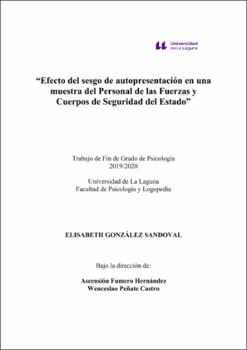Efecto del sesgo de autopresentación en una muestra del Personal de las Fuerzas y Cuerpos de Seguridad del Estado
Fecha
2020Resumen
El personal de las Fuerzas y Cuerpos de Seguridad del Estado español tiene a su
disposición la licencia para el uso y manejo de armas mientras se encuentre en activo y
sujeto a renovaciones que valoren el estado de salud general. Esta investigación tiene
como objetivo realizar una evaluación de las aptitudes psicológicas teniendo en cuenta el
efecto del sesgo de autopresentación. Para la recogida de los datos se utilizó una muestra
de 11 policías a los que se les aplicó en un primer momento un cuestionario con la
instrucción de dar su imagen real y, en un segundo momento dando su mejor imagen. La
hipótesis que se planteó en el estudio es que habrá una mayor tendencia a dar respuestas
socialmente aceptables cuando den su imagen ideal frente a su imagen real. Los bloques
evaluados fueron el estado cognitivo, consumo problemático de alcohol y drogas y las
características y trastornos de personalidad. Con los datos obtenidos se realizaron análisis
de correlaciones y de diferencias de medias entre los dos momentos. Los resultados que
apoyan la hipótesis reflejaron diferencias significativas en la modificación de las
respuestas cuando dieron su imagen real frente a la ideal en los factores de neuroticismo,
extraversión, responsabilidad, impulsividad, consumo de alcohol y drogas, depresivo y
mentiras. Los resultados diferenciales entre géneros en ambos momentos mostraron
significación a favor de las mujeres en el factor anancástico y, a favor de los hombres en
el factor esquizotípico, disminuyendo en ambos casos su puntuación al dar su mejor
imagen. Como conclusión, se observa que el sesgo de autopresentación parece influir en
las respuestas que emiten los agentes cuando dan su imagen ideal, adecuándose a las
características psicológicas que indican un buen uso de las armas de fuego. The personnel of the Spanish State Security Forces and Corps have a license for the use
and handling of weapons at their disposal while they are on active duty and subject to a
renewal process that assesses their general state of health. This research aims to carry out
an evaluation of psychological aptitudes, taking into account the effect of selfpresentation bias. To collect the data, a sample of 11 police officers was used. They were
given a questionnaire with instructions to first provide a real image of themselves and,
secondly, to provide their ideal image of themselves. The hypothesis for the results of the
study was that there would be a greater tendency to give socially acceptable answers when
they give their ideal image compared to their real image. The blocks evaluated were
cognitive status, problematic alcohol and drug consumption, and personality
characteristics and disorders. Analysis of correlations and mean differences between the
two moments were performed with the data obtained. The results that support the
hypothesis reflected significant differences in the modification of the responses when
they gave their real image versus the ideal one in the factors of neuroticism, extraversion,
responsibility, impulsiveness, alcohol and drug consumption, depressive and lies. The
results of the gender differentials at both moments showed significance in favor of women
in the ananastic factor and in favor of men in the schizotypal factor, in both cases
decreasing their score by giving their best image. In conclusion, it is observed that the
bias of self-presentation seems to influence the responses that the agents emit when they
give their ideal image, adapting to the psychological characteristics that indicate a good
use of firearms.





